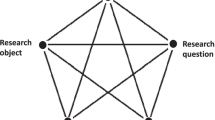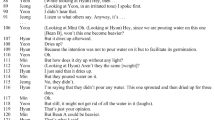Abstract
Small-group discussions involving students and their teacher that focus on meanings constructed during the mathematics lessons or solutions to problems produced in these lessons offer great potential for debate and argument. An analysis of the epistemological nature of knowledge can give deeper insight, to gain a better understanding of the emerging discontinuities in argumentations, negotiations, and clarifications about contentious meaning differences that arise. In most cases mathematical interactions between students and a teacher about contentions are very fragile and seem to be handled more or less directly—by side-stepping to another topic or by resolving via the teacher’s authority, for example. Therefore, the maintenance of such negotiation processes in mathematics teaching is a specific challenge for students and the teacher. The type of closure of these processes seems to be related to the emerging maintenance processes. In this paper, small-group discussions are interpretatively analyzed in the three steps “Initiation—Maintenance—Closing” with the focus on fundamental (dialogical) learning.















Similar content being viewed by others
Notes
A discussion of classroom talk about this diagram can be found in Gellert and Steinbring (2012).
Named after Zoltan Paul Dienes.
References
Alrø, H., & Skovsmose, O. (2004). Dialogue and learning in mathematics education: Intention, reflection, critique. Dordrecht: Kluwer.
Althof, W. (Ed.). (1999). Fehlerwelten: Vom Fehlermachen und Lernen aus Fehlern. Opladen: Leske+Budrich.
Arsac, G., Balacheff, N., & Manté, M. (1992). Teacher’s role and reproducibility of didactical situations. Educational Studies in Mathematics, 23(1), 5–29.
Bauersfeld, H. (1980). Hidden dimensions in the so-called reality of a mathematics classroom. Educational Studies in Mathematics, 22(1), 23–41.
Cobb, P. (1995). Mathematical learning and small-group interaction: Four case studies. In P. Cobb & H. Bauersfeld (Eds.), The emergence of mathematical meaning: Interaction in classroom cultures (pp. 25–130). Hillsdale: Lawrence Erlbaum.
Devlin, K. (2003). Mathematics, the science of patterns: The search for order in life, mind, and the universe. New York: Holt.
Gellert, A., & Steinbring, H. (2012). Dispute in mathematical classroom discourse—“No go” or chance for fundamental learning? Orbis scholae, 6(2), 103–118.
Gellert, A., & Steinbring, H. (2014). Students constructing meaning for the number line in small-group discussions: Negotiation of essential epistemological issues of visual representation. ZDM—The International Journal on Mathematics Education, 46(1), 15–27.
Kamii, C. (1985). Young children reinvent arithmetic: Implications of Piaget’s theory. Columbia: Teacher College Press.
Krummheuer, G. (2000). Studies of argumentation in primary mathematics education. ZDM—The International Journal on Mathematics Education, 32(5), 155–161.
Meyerhöfer, W. (2013). Sind die Elemente der Stellenwerttafel Ziffern oder Das IQB als Herrscherin über die Stellenwerttafel. Beiträge zum Mathematikunterricht, 656–659.
Miller, M. (2006). Dissens. Zur Theorie diskursiven und systemischen Lernens. Bielefeld: Transcript.
Pimm, D. (1989). Speaking mathematically: Communication in the mathematics classroom. London: Routledge.
Richter, D., Reiss, K., Stanat, P., & Pant, H. A. (2012). Stellungnahme zur Pressemitteilung der Universität Paderborn zur Beispielaufgabe „Stellenwerttafel“des IQB-Ländervergleichs 2011 in der Primarstufe. http://www.iqb.hu-berlin.de/laendervergleich/LV2011/Bericht. Accessed 6 May 2014.
Selman, R. L. (2003). The promotion of social awareness: Powerful lessons from the partnership of developmental theory and classroom practice. New York: Russell Sage Foundation.
Shimada, S. (1997). The significance of an open-ended approach. In J. Becker & S. Shimada (Eds.), The open-ended approach: A new proposal for teaching mathematics. Reston: National Council of Teachers of Mathematics.
Steinbring, H. (1995). Zahlen sind nicht nur zum Rechnen da! Wie Kinder im Arithmetikunterricht strategisch-strukturelle Vorgehensweisen entwickeln. In G. N. Müller & E. C. Wittmann (Eds.), Mit Kindern rechnen (pp. 225-239). Frankfurt a. M.: Arbeitskreis Grundschule - Der Grundschulverband - e.V.
Steinbring, H. (2005). The construction of new mathematical knowledge in classroom interaction: An epistemological perspective. New York: Springer.
Swan, M. (2006). Collaborative learning in mathematics: A challenge to our beliefs and practices. London: NRDC and NIACE.
Voigt, J. (1995). Thematic patterns of interaction and sociomathematical norms. In P. Cobb & H. Bauersfeld (Eds.), The emergence of mathematical meaning: Interaction in classroom cultures (pp. 163–201). Hillsdale: Lawrence Erlbaum.
Voigt, J. (1998). The culture of the mathematics classroom: Negotiating the mathematical meaning of empirical phenomena. In F. Seeger, J. Voigt, & U. Waschescio (Eds.), The culture of the mathematics classroom (pp. 191–220). Cambridge: Cambridge University Press.
Wood, T. (1994). Patterns of interaction and the culture of mathematics classrooms. In S. Lerman (Ed.), Cultural perspectives on the mathematics classroom (pp. 149–168). Dordrecht: Kluwer.
Acknowledgments
I would like to thank the working group ‘EInmaL’ (Professor H. Steinbring) for the profound discussions within the project and especially the examples used in this paper. Also many thanks to the reviewers for their advice, and to Professor C. Morgan and PhD J. Ingram for editing the English version.
Author information
Authors and Affiliations
Corresponding author
Rights and permissions
About this article
Cite this article
Gellert, A. Students discussing mathematics in small-group interactions: opportunities for discursive negotiation processes focused on contentious mathematical issues. ZDM Mathematics Education 46, 855–869 (2014). https://doi.org/10.1007/s11858-014-0594-y
Accepted:
Published:
Issue Date:
DOI: https://doi.org/10.1007/s11858-014-0594-y




